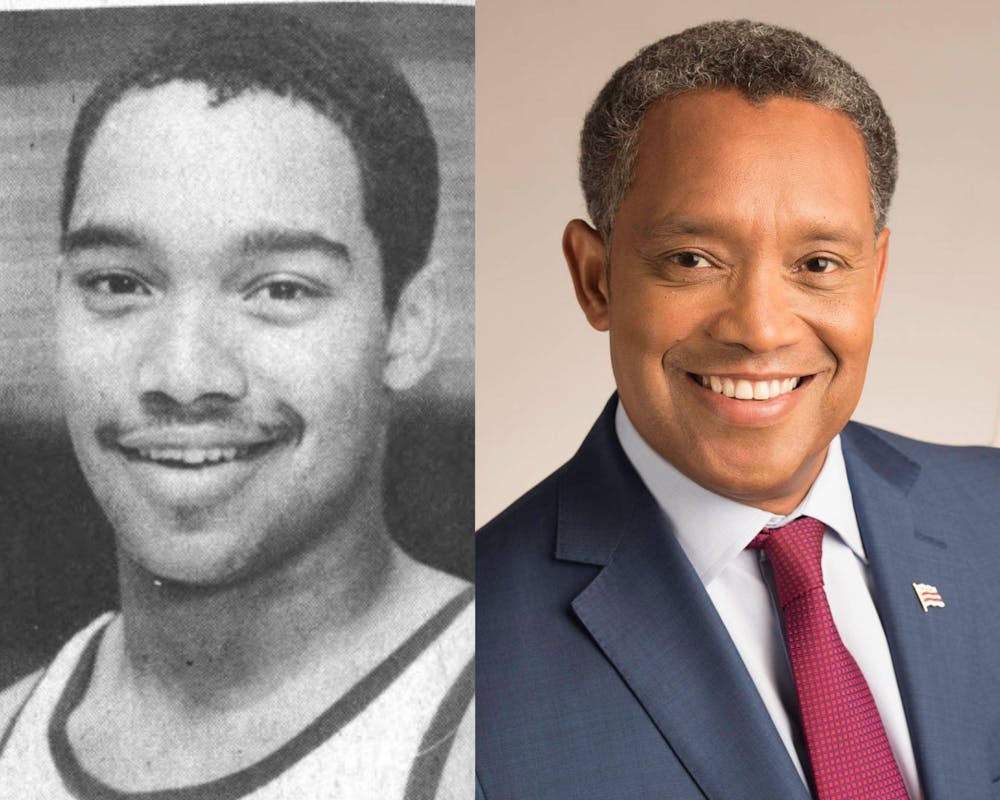Karl Racine’s eventful life has taken him from the Red and Blue of the Palestra to the red, white, and blue of our nation’s capital.
Serving as the Attorney General for the District of Columbia since 2015, the former Penn men’s basketball standout was a valuable member of Penn’s Ivy League-winning teams during his freshman and senior seasons. Now, he works to carry out justice in Washington.
Racine’s story begins in Port-au-Prince, Haiti, where he was born and lived before his family moved to Washington, D.C. when he was three years old. As a star guard on the court for St. John’s College High School, he quickly garnered collegiate attention and arrived at Penn in the fall of 1981 as a talent to watch.
“[Racine is] A natural take-charge type of player … he can be expected to see more than token action in this his first season,” the DP wrote when profiling the incoming class of recruits.
He was a regular for the Quakers all four years he played, but his final two seasons with the team — when he served as captain — were where Racine really made his mark. He averaged 14.3 points a game across the two-year period, playing in 51 of the team’s 53 games and leading the team in scoring as a junior.

Sophomore Karl Racine against Princeton
He drew eyes whenever on the court, but he would etch his name in Penn men’s basketball lore on Feb. 1, 1983. Playing at archrival Princeton’s Jadwin Gym, the two teams were locked in a defensive standoff and deadlocked at 39 coming down to the wire. Racine was fouled with two seconds left and nailed both his free throws to hand the Quakers a dramatic two-point win.
“He’s one of the guys we rely on,” then-Penn coach Craig Littlepage told the DP after the game. “When those situations occur when we have to shoot free throws, we would like for the ball to be in his hands and for him to eventually go to the free-throw line.”
RELATED:
Former Penn men's basketball standout leads lawsuit against Donald Trump
From student to professor, Nakia Rimmer has seen it all as a Penn basketball fan
Despite his natural talent and leadership on the court, Racine remained humble and was the first to share the spotlight with his teammates. It was this selflessness that helped Red and Blue capture an Ivy League title in his final season.
"I realize that it's a great honor to be named captain and I am grateful for the honor,” Racine told the DP in November 1984. “But other than that, being named captain really won't affect what I do that much. I think I will be a leader on the court, but my fellow seniors will all help out with leadership."
Racine’s senior season actually got off to a rocky beginning, with the team slumping to a dismal 0-7 start. However, the Red and Blue got hot at the right time and worked their way to a 10-4 conference record and a bid to March Madness, where the 15th-seeded Ivy champs fell by a score of 67-55 to heavily favored Memphis.
Following his Penn graduation in 1985, Racine matriculated to law school at Virginia. Outside of class, he volunteered in a legal clinic for migrant farm workers, inspired by his own family’s experience in coming to the country, and along with his mother compiled the first-ever Haitian Creole to English legal dictionary.
His lengthy professional career includes experience both in private firms and as a public defender. The latter saw him working at a different kind of court than at Penn, this time with Washington residents who could not afford a lawyer. From 1997-2000, Racine took a position as Associate White House Counsel in the Clinton Administration, where he advised the president and his staff on various legal matters.
Racine made history in 2006 as the first Black managing partner of a top-100 law firm when he was elected to the position at Venable LLP, where he had worked on and off since 1989.
After decades of service and work in the D.C. area, Racine was elected the District of Columbia's Attorney General in November 2014, the first time the position was open for election rather than appointment by the city’s mayor. He won re-election with 93% of the vote four years later, and will remain in his current role until at least early 2023.
Most recently, Racine has been in the news for handling a number of post-election lawsuits and prosecuting some of those involved with the Jan. 6 insurrection at the Capitol. In addition to his already-busy livelihood, he is also an fervent supporter of statehood for the District of Columbia, which currently does not have any voting members of Congress.
No matter where his career takes him or what cause he backs, Racine will never forget his illustrious roots with the Red and Blue.









